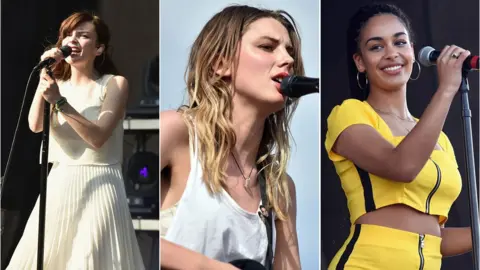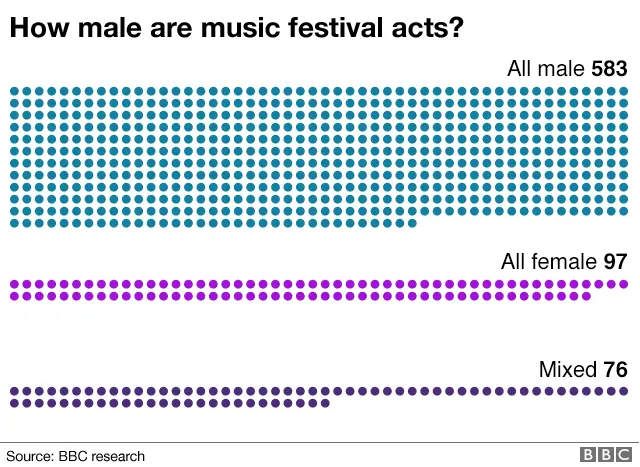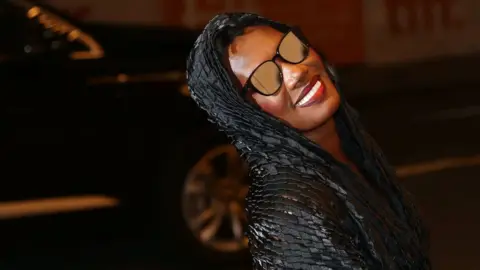Festivals 2018: The gender gap in music festival line-ups
 Getty Images
Getty ImagesThis year, 45 UK festivals pledged to achieve a 50-50 gender balance by 2022. So how male are music festival line-ups in 2018?
BBC Reality Check looked at the biggest festivals in the UK by attendance and analysed their posters to see how they were doing with gender representation so far. Glastonbury, the country's biggest festival, isn't taking place this year.
We used posters as an indication of which acts festivals wanted to highlight as their biggest-hitting - and they're also important as that's often what punters look at when deciding which festival tickets to buy.
An analysis of 756 acts advertised on the posters of nine festivals found 77% were all male.

Another 9% were groups with more male than female members.
Just 13% of acts advertised on posters online were all female - that's 97 bands, singers and DJs - and another six bands were majority female.
Two-thirds of the mixed groups advertised had female lead singers (another 38 acts) despite most of the band members being male.
The 10 biggest festivals by capacity in the UK are:
- Glastonbury (not happening this year)
- Download
- V-Festival, this year replaced by new festival Rize
- Reading and Leeds
- Creamfields
- Isle of Wight
- BoomTown
- Wireless
- Latitude
- Bestival
Overall, less than a quarter of festivals' biggest acts featured any women at all. But there was a lot of variation between different festivals.
Based on their posters, Bestival and Latitude had the highest proportion of all female acts, 29% and 30% of advertised acts respectively.

Download festival had the smallest proportion of female acts - just 5% - followed by BoomTown with 6% and Creamfields and Wireless tying in third-to-last place with 9%.
However, since publishing its line-up - following controversy over the lack of women, flagged in a tweet by singer Lily Allen - Wireless has announced an additional all-female stage, with 20 acts being highlighted as headlining across the three days.
Allow X content?
The company that runs Wireless, Festival Republic, also pointed to its scheme ReBalance, launched last summer, which offers 36 female artists one week's studio recording time.
These figures don't capture every single act at every festival, but they serve as a helpful indication.
Bestival, whose poster featured 30% all-female acts, said its crowd was mostly female.
And while BoomTown festival's poster featured only eight all-female acts (6% of the total), the split of its crowd is more or less 50-50.
Despite commitments made, like the KeyChange 50:50 by 2022 pledge signed up to by 45 UK festivals, some question why it should take that long to achieve balance.
Festivals aren't like workplaces, which often have to wait for the people at the top to move on before they can be replaced. In theory, there was no reason a festival couldn't achieve gender balance sooner, said music journalist Helen Meriel Thomas.
"The events which have signed up to the gender equality initiative have three years to get their act together. This still seems like an awfully long time to fire up Google and search for 'female artists'," she said.
 Getty Images
Getty ImagesA spokeswoman for BoomTown festival said gender balance was "at the forefront of our minds".
"But rather than it being fully about the people booked for the line-up, we also need to focus on why there aren't more all-female or female-fronted bands in the music industry as a whole.
"The line-up representation is probably a reflection on the music industry as a whole and less about individual festivals," she said.


